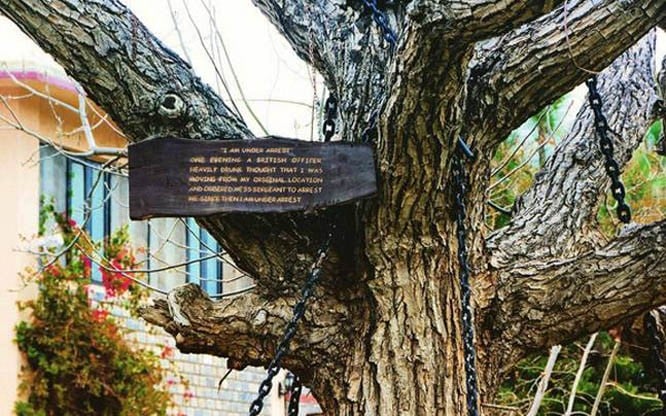
A tree in former Fata represents the absolute power of the colonial state whose legacy continues to this day

Not many would believe that a banyan tree in Landi Kotal, a sub-division of the Khyber district, neighbouring Peshawar, has been under arrest since 1898. No one in over a century has been able to set the tree free from the chains on an imaginary charge ordered by a British officer in drunken stupor.
Legend has it that in 1898, British army officer James Squid was sitting in his lawn when he suspected the tree was lurching towards him. The officer screamed… the sergeants and officers rushed to him to provide protection. Thereafter Squid ordered the tree to be chained. Ever since, no officer has been able to overturn the brutal colonial order.
A plaque inscribed with "I am under arrest" is nailed to the tree trunk.
The tree has withstood many harsh seasons in the FCR, which once constituted Fata. It is now a part of the KP province. It’s obvious that even after the merger very few things have changed in Fata. The legacy of Frontier Crimes Regulations (FCR) clearly lingers on.
Another example of colonial brutality in the territory is the main wooden gate of the fort in Shabqadar, a small town 35 kilometres from Peshawar. Reports suggest that the door was chained even before the tree, in around 1840, when a group of Mohmand tribesmen attacked the fort. The fighting lasted the entire night. But Prince Sher Singh, who was staying at the fort at the time of the attack, was furious and immediately ordered an investigation into how the tribesmen had entered the door. A high level three-member committee was constituted, which put the blame of the bloody invasion on the fort’s wooden gate and sentenced to chain it for a hundred years.
"Chaining a tree is only symbolic and purely mythological. Most of these acts appear to be the creation of a dictatorial mindset and have nothing to do with any rules, regulations or law. Britishers used to do symbolic things to make the writ of the state well-known to the indigenous population by resorting to such dramatic acts, probably as a means of psychological deterrence, nothing else," Mohammad Faheem Wali, a senior lawyer of the Supreme Court of Pakistan, tells TNS.
For many, the chained tree in Landi Kotal and the wooden door of the fort in Shabqadar is a symbol of the draconian FCR, a black law which governed the seven tribal agencies and six Frontier Regions from the time of the British Raj. Under the FCR, an officer could order the arrest of any tribesman for a valid reason or not and without the right to appeal granted to the victim.
Since the repeal of FCR over a year ago, things have not changed much in Fata. There are still no courts or other forums where one can file an appeal against the decisions of an administrative officer.
The locals believe the powerful administrative officers, now called deputy commissioners, had absolute power and they probably didn’t release the tree and the gate only as a show of this symbolic power. "From 1898 not a single officer bothered to correct the sentence wrongly awarded by a former administrative officer. The release of the poor tree after the merger of Fata with KP can convey a huge positive message that the government really wants to correct the wrongs done in the tribal areas in the past," a former teacher from Khyber Agency Haji Abdul Rahim tells TNS.